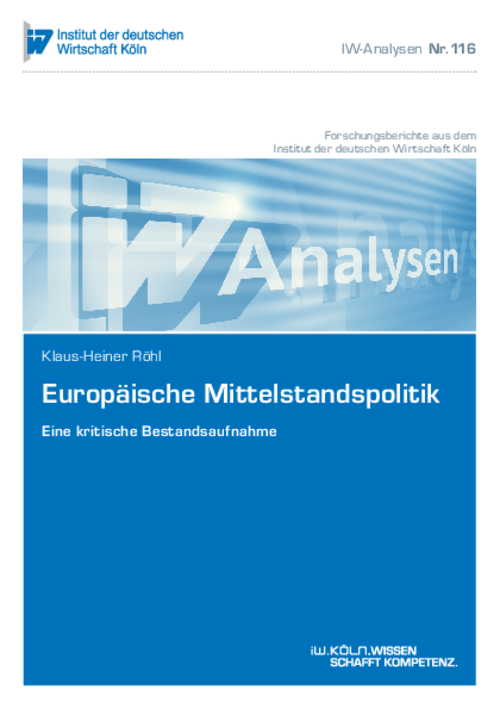The European Union policy and regulation influence the almost 23 million small and medium-sized enterprises (SMEs) and similarly structured larger companies in the 28 member countries in many different ways. So far, however, attempts at a distinct EU SME policy have remained fragmentary.

European SME Policy
IW-Analyse

The European Union policy and regulation influence the almost 23 million small and medium-sized enterprises (SMEs) and similarly structured larger companies in the 28 member countries in many different ways. So far, however, attempts at a distinct EU SME policy have remained fragmentary.
Though the Small Business Act of 2008 drew attention to the needs of SMEs, it applies primarily to start-ups and small enterprises. The subsequent European economic crisis brought start-ups and established SMEs further into the focus of policymakers in Brussels, who entertained great hopes for them as creators of new jobs. Nevertheless, a glance at the still high agricultural spending in the EU budget shows only too clearly how far off the radar the interests of SMEs continue to be. Particularly problematic is the EU’s insistence on regarding larger family businesses with at least 250 employees or 50 million euros in turnover as large companies and treating them like large corporations. A systematic EU SME policy would reduce the burden of red tape and include family businesses which have outgrown the EU’s definition of an SME. Moreover, EU policymakers should recognise the potential role of small and medium-sized manufacturing companies in fulfilling their aim of expanding manufacturing industry in Europe by 2020.

Klaus-Heiner Röhl: Europäische Mittelstandspolitik – Eine kritische Bestandsaufnahme
IW-Analyse

More on the topic
![[Translate to English:] Das Gebäude des Weißen Hauses in Washington, D.C. in den Vereinigten Staaten von Amerika. [Translate to English:] Das Gebäude des Weißen Hauses in Washington, D.C. in den Vereinigten Staaten von Amerika.](/fileadmin/_processed_/c/1/csm_GettyImages-2161499385_White_House_Editorial_884306add8.jpg)
Trump or Harris or ...? What Europe must prepare for
A few months before the presidential election in the USA, Donald Trump has a good chance of being re-elected. On the Democratic side, the incumbent president has withdrawn his candidacy after a long period of hesitation, while Vice President Kamala Harris is ...
IW
Compendium 5.5: CO2 Regulation of Road Transport in Europe
With the Compendium CO2 Regulation in Europe, the IW has been providing the interested public with a comprehensive collection of data on the development of CO2 emissions from passenger car traffic in the European Union, as well as on the applicable regulatory ...
IW